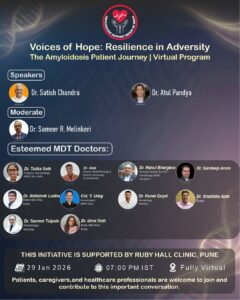Affects By Amyloidosis
1. Heart (Cardiac Amyloidosis)
When amyloid deposits build up in the heart, they cause stiffening of the heart muscle, making it harder for the heart to pump blood effectively. This condition is called restrictive cardiomyopathy, which means the heart has trouble relaxing between beats. As a result, less blood is pumped to the rest of the body, leading to symptoms like shortness of breath, fatigue, swelling in the legs (edema), and irregular heartbeat (arrhythmia). In severe cases, amyloid deposits can cause heart failure, where the heart becomes too weak to supply enough oxygen to the body.
Amyloid can also affect the electrical system of the heart, leading to abnormal heart rhythms (arrhythmias), which can cause dizziness, fainting, or even sudden cardiac arrest. AL amyloidosis and ATTR amyloidosis are the most common forms that affect the heart, and if left untreated, cardiac amyloidosis can be fatal.
2. Kidneys (Renal Amyloidosis)
The kidneys are responsible for filtering waste and excess fluids from the blood. When amyloid proteins deposit in the kidneys, they damage the tiny filtering units called glomeruli, causing protein leakage into the urine (proteinuria). This leads to nephrotic syndrome, a condition where the body loses too much protein, causing severe swelling in the legs, high cholesterol levels, and increased risk of blood clots.
As kidney function worsens, waste and toxins build up in the body, leading to chronic kidney disease (CKD). In the most severe cases, kidney failure occurs, and patients may need dialysis or a kidney transplant. AL amyloidosis and AA amyloidosis are the most common forms that affect the kidneys.
3. Nervous System (Peripheral and Autonomic Neuropathy)
Amyloidosis can severely impact the nervous system, leading to nerve damage (neuropathy). There are two main types of nerve involvement in amyloidosis:
- Peripheral neuropathy occurs when amyloid deposits damage the nerves in the hands and feet, leading to numbness, tingling, burning pain, and muscle weakness.
- Autonomic neuropathy affects the nerves that control involuntary body functions, leading to dizziness when standing (due to low blood pressure), excessive sweating, digestive problems, and difficulty controlling bladder function.
Patients with hereditary ATTR amyloidosis (mutations in the TTR gene) are particularly prone to nerve-related symptoms, but AL amyloidosis can also cause neuropathy.
4. Liver and Spleen (Hepatic and Splenic Amyloidosis)
Amyloid deposits in the liver cause hepatomegaly (enlarged liver), leading to abnormal liver function, fatigue, and swelling in the abdomen due to fluid buildup (ascites). In some cases, liver enzyme levels may become elevated, which can be detected through blood tests. AA amyloidosis and AL amyloidosis commonly affect the liver.
Similarly, when amyloid deposits in the spleen, it causes splenomegaly (enlarged spleen), which can lead to a weakened immune system and an increased risk of infections.
5. Digestive System (Gastrointestinal Amyloidosis)
Amyloid deposits in the digestive system can disrupt normal digestion and nutrient absorption. Patients with gastrointestinal amyloidosis may experience:
- Diarrhea or constipation due to nerve damage in the intestines.
- Nausea, vomiting, and loss of appetite if the stomach lining is affected.
- Weight loss and malnutrition due to poor absorption of nutrients.
- Bleeding in the gastrointestinal tract, leading to anaemia (low red blood cell count), causing fatigue and weakness.
AL amyloidosis and AA amyloidosis are the most common forms that affect the digestive system.
6. Lungs and Respiratory System
Although rare, amyloid deposits can accumulate in the lungs, leading to breathing difficulties, chronic cough, and reduced lung capacity. Some patients may also develop pleural effusion, where excess fluid builds up around the lungs, making it even harder to breathe. Localized amyloidosis can sometimes affect the lungs, while AL amyloidosis and AA amyloidosis can lead to more widespread respiratory symptoms.
7. Skin and Soft Tissues
Amyloidosis can also affect the skin, joints, and other soft tissues, causing symptoms such as:
- Waxy, thickened patches of skin that may appear on the face or extremities.
- Easy bruising, especially around the eyes (known as periorbital purpura).
- Joint stiffness and pain, particularly in dialysis-related amyloidosis, where amyloid builds up in the bones and joints.
Localised amyloidosis can also affect soft tissues, such as the bladder or vocal cords, leading to urinary problems or hoarseness.

